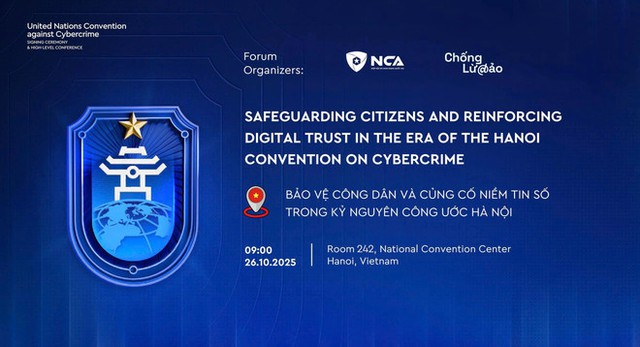Ha Noi Convention: Historic milestone in global fight against cybercrime
VGP - The signing ceremony of the United Nations Convention against Cybercrime in Ha Noi marks a historic milestone in the global battle against one of critical global challenges of the era.

The event will draw the participation of UN Secretary-General Antonio Guterres, representatives from nearly 100 countries, along with more than 100 international and regional organizations. In addition, 40 thematic discussions will be held on the occasion.
State President Luong Cuong affirmed that Viet Nam considers cybercrime prevention and combat one of its top national security priorities, thus the Southeast Asian nation will actively join hands with the international community in this fight.
This is the first time a location in Viet Nam — the capital city of Ha Noi — has been associated with a global multilateral treaty in a field of international significance, reflecting Viet Nam's growing global standing and the international community's recognition of Viet Nam's contributions during the Convention's development process," Deputy Minister of Foreign Affairs Dang Hoang Giang noted at a press briefing ahead of the event.
Focus on combating cybercrimes targeting children
The Convention consists of nine chapters and 71 articles, drafted over a span of four years, covering key topics such as: criminalizing online offenses; mechanisms for international cooperation in investigations, extradition, sharing electronic evidence, seizure and handling of criminal assets, witness protection, and victim support.
Chapter II requires each State Party to criminalize actions under national law, including unauthorized access, deletion, alteration, or obstruction of information systems; misuse of electronic data or devices; forgery, theft, or fraud involving information technology systems.
Specifically for cybercrimes targeting children (individuals under 18), the Convention dedicates two articles outlining offenses that must be criminalized, such as production, distribution, transmission, broadcasting, sale, possession, or even accessing child sexual exploitation materials through online systems or other storage devices (memory cards, photos, hard drives, CDs, etc.).
Financing, laundering proceeds from such crimes, or grooming children to participate in related acts must also be criminalized as separate offenses under national law. In cases involving self-generated materials created by minors, criminal responsibility can be considered for exemption.
For private images involving adults (aged 18 and above), Article 16 requires criminalization of unauthorized distribution.
States may determine their definition of "private imagery" based on the Convention's general guidance: recordings of an adult captured by any means, including photos or videos, with erotic nature where genitals are exposed or sexual activities are depicted in a private context, and where the subject reasonably expects privacy.
The Convention also recommends that States consider criminalizing acts at the intent or preparatory stage of crime. When the offender is a legal entity, penalties must be effective and proportionate.
Each country to establish a 24/7 contact network
Under Article 41, each State Party must designate a 24/7 contact network to provide immediate support for the investigation, prosecution, and preservation of electronic evidence related to covered offenses.
This 24/7 network will facilitate or directly conduct actions such as identifying suspect locations, providing technical advice, collecting evidence, providing legal information, and supplying electronic data in emergency situations.
The network must maintain trained and equipped personnel capable of rapid communication with corresponding networks in other countries.
By signing the Ha Noi Convention, States commit to close cooperation in investigating cybercrime, including identifying suspects, tracking their activities or whereabouts, and tracing illicit financial flows. Countries may also sign bilateral or multilateral agreements to support case resolution and asset recovery.
According to the United Nations Office on Drugs and Crime (UNODC), cybercriminals operate without regard to geographical borders, while law enforcement agencies must respect jurisdictional boundaries, posing significant challenges.
Electronic evidence is often dispersed across multiple jurisdictions and can vanish before legal assistance procedures are completed. National legal differences also complicate investigation and prosecution processes.
Currently, when investigators need electronic evidence stored by a foreign company, requests must pass through numerous layers of judicial procedures, often taking days or even months.
Cybercrime is therefore considered one of the most critical global challenges of the era. The Ha Noi Convention will establish a new mechanism expected to help overcome these obstacles./.

